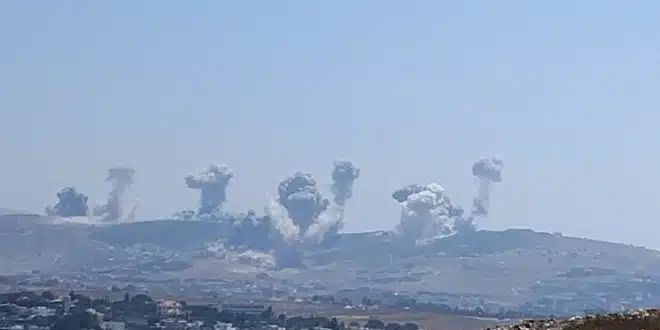Israeli warplanes launched a series of strikes on Sunday against the Ali al-Taher hills near Nabatieh al-Fawqa in southern Lebanon, an area that has faced repeated bombardment since the ceasefire agreement reached last November.
According to the Israeli military, the attack targeted facilities linked to Hezbollah, including underground positions used for military activity. “A short while ago, the IDF struck military infrastructure, including underground infrastructure, at a Hezbollah site in which military activity was identified, in the area of the Beaufort Ridge in southern Lebanon,” the army said in a statement. It added that such activity constituted “a violation of the understandings between Israel and Lebanon.”
Details of the Strikes
Lebanon’s National News Agency (NNA) reported heavy bombardment in the forested Ali al-Taher area, where large fires broke out as a result. Strikes were also recorded in al-Dabsheh, where significant structural damage occurred. NNA described Israeli fighter jets firing “a large number of missiles,” while images from AFP showed thick black smoke billowing across the skyline.
The Ali al-Taher hills, located near the historic Beaufort Castle ridge, have been a recurring target over the past year due to their strategic position overlooking parts of southern Lebanon and northern Israel.
Context of Renewed Hostilities
Tensions between Hezbollah and Israel sharply escalated after the Gaza war broke out, leading to more than a year of cross-border exchanges. That conflict culminated in two months of open warfare last year before a ceasefire deal was reached in November.
The truce, mediated with international backing, tasked Lebanon’s army—supported by U.N. peacekeepers—with deploying across the south and dismantling Hezbollah’s military infrastructure. Despite this arrangement, Israel has continued its campaign of airstrikes, insisting that it will not halt operations until Hezbollah has been fully disarmed.
Under pressure from Washington, the Lebanese government has also instructed its armed forces to develop a plan by the end of this year to remove Hezbollah’s arsenal. However, the group has firmly rejected disarmament, vowing to resist any attempt to strip it of weapons. Hezbollah argues that its military presence remains essential for defending Lebanon against Israel.
Wider Implications
The renewed strikes highlight the fragility of the ceasefire and the broader risks of a relapse into all-out conflict. With Lebanon already grappling with political paralysis and economic crisis, any escalation could further destabilize the country.
For Israel, continued operations reflect a strategy of deterrence but also carry the risk of widening the conflict at a time when its security forces remain heavily engaged in Gaza. For Hezbollah, the strikes pose a challenge between demonstrating resilience to its supporters and avoiding a confrontation that could drag Lebanon into another devastating war.
Diplomatic efforts, particularly from the U.S. and U.N., will be critical in the coming months as both sides test the limits of the November agreement. The Lebanese Army’s disarmament plan is likely to become a central flashpoint, shaping not only Israel–Hezbollah relations but also the broader regional balance between Iran and Western powers.


